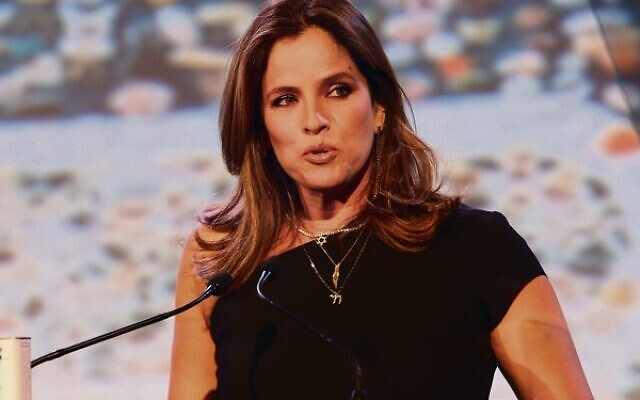Taking back Zionism
Around 750 people packed The Venue to hear the Israeli actress, author and advocate, Noa Tishby, and former Israel Defence Forces chief Lt Gen Aviv Kochavi discuss issues facing the Jewish people and Israel.
Jewish people need to reclaim the word Zionism, Noa Tishby told guests at JNF’s gala event on Tuesday.
Around 750 people packed The Venue to hear the Israeli actress, author and advocate speak about her passion of defending the Jewish people and Israel. Attendees were also treated to a Q&A with former Israel Defence Forces chief Lt Gen Aviv Kochavi, conducted by veteran Israeli journalist Yoav Limor.
Tishby told of how antisemitism used to be “hidden from view” and “something that you should be ashamed of”.
“I couldn’t have imagined where we’d be now, when classic antisemitic tropes are being spewed proudly by political and cultural leaders. We are in the year 2023 and we’re actually having a conversation about whether or not Hitler had some good traits,” she lamented.
“And then, there’s this new cool and trendy social justice cause … it’s called anti-Zionism … let me just be clear. Anti-Zionism is antisemitism.”
She said the word Zionism “was taken away from us”.
“Zionism is the Jewish people’s right to have a state and when somebody tells you that they’re not antisemitic but just anti-Zionist, you should ask them which other countries they would like to dismantle, because it’s usually just one,” Tishby said.
“When the State of Israel gets attacked, when Israel constantly gets demonised and vilified and disproportionately singled out, we all know this is more than just politics. And there’s no place where this is more apparent, common or sadly, popular, that on college campuses.
“And I recently read that here in Australia, two out of three Jewish students have felt antisemitism and over 50 per cent of university kids hide their Jewish identity.
“This is why we’re all here. To fight back.
“As a Jewish community, we’ve seen it all … discrimination, bigotry and persecution throughout the generations. We’ve been through it all and we got out of it on the other side, stronger, smarter and more reliable. And together, we’re going to do it again.”
Kochavi, meanwhile, spoke of the IDF’s success in maintaining deterrence.
“Our enemies do not want war. They have seen our capabilities,” he said.
“And I think that the most impressive fact is that we have been striking all of our enemies for the last 10 years, in most cases, they hold back. They restrain – I think it speaks for itself.”
But he said, “Sometimes war happens.
“One thing can lead to another and we have to be humble and we have to prepare ourselves,” he said.

Answering in the affirmative when asked if the IDF is a moral army, he said the main criteria were “the use of force stems from the right reasons” – in this case protecting Israeli citizens – and not harming innocent people.
“Embedded in our calculation all the time is how not to harm uninvolved people,” he said. “It makes the fighting much more difficult. It’s much easier to flatten a building.
“I cannot tell you that we are always successful. I can tell you that always, we incorporate those kinds of considerations into our operation planning and we are doing out utmost in order to fight in the way the Jewish people need to fight terrorism.”
Asked about a “behind the scenes” story from his service, Kochavi told of how, during the Second Intifada, a successful mission was concluded in Nablus on the eve of Yom Hashoah. Speakers were brought in and placed in the city for soldiers to hear the memorial siren.
“It was a very special moment – many, many dimensions intertwined in that moment.”
First, he said, the mission saved the lives of countless Israeli citizens.
“Secondly, against the backdrop of the Memorial Day of the Holocaust, it was we, the Israelis, we can protect ourselves. But thirdly, we are doing it in a very moral way.
“So in that regard, this moment captured, you know the very essence of the IDF.”
Kochavi also spoke about the role of women in the IDF: “They are almost 50 per cent of the manpower. Their contribution is phenomenal.” And he praised lone soldiers who leave their home countries to serve in Israel. He admitted that Israel “must find a new paradigm” to better integrate Charedim and Israeli Arabs into the military.
He lauded the skills and experience soldiers gain from service.
“We teach them teamwork and we teach them to work under pressure. And [there are] those who go to leadership courses to be commanders,” he said.
“And they take [that] expertise back to Israeli society. They are coming from the military much more mature, much more experienced, with managerial skills, with leadership skills, not afraid of failure, not afraid of tough situations.
“So I think the Israeli military is the best and the most successful start-up of the Jewish people.”
Looking to the future, he said, “We must strengthen the common denominator” of people in Israel and the Diaspora.
“I think of the whole Jewish community as part of Israel,” he said.
“The State of Israel is more than a protected territory. It’s an idea.
“So we have to come with a holistic solution and inclusive policy for all Israelis and all Jewish communities.”


comments